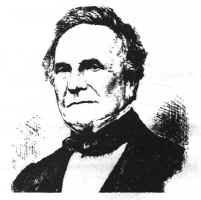 Article taken from "Backsights"
Magazine published by Surveyors Historical Society
Article taken from "Backsights"
Magazine published by Surveyors Historical Society |
CHARLES
BABBAGE
by Mary M. Root
 Charles Babbage was a prodigal
mathematician, a social charmer, a renaissance personality, and a genius whose
life-work predicated the modern computer. Babbage's creations were the
Difference engines, so called because they were designed to compute tables of
numbers according to the method of finite differences, and the more complex
Analytical Engines, which utilized the concern of feeding the results of
calculations back into the beginning of subsequent calculations. Today,
Charles Babbage (1791-1871) is acknowledged as the father of modern computers
because he foresaw what its basic elements required: storage, mill,
control, input, output, decision-making, repetition and programs.
Unfortunately, the brilliant Analytical Engine was never completed, due to a
breach of faith and money from the British government and a lack of precision
milling in that period. Charles Babbage was a prodigal
mathematician, a social charmer, a renaissance personality, and a genius whose
life-work predicated the modern computer. Babbage's creations were the
Difference engines, so called because they were designed to compute tables of
numbers according to the method of finite differences, and the more complex
Analytical Engines, which utilized the concern of feeding the results of
calculations back into the beginning of subsequent calculations. Today,
Charles Babbage (1791-1871) is acknowledged as the father of modern computers
because he foresaw what its basic elements required: storage, mill,
control, input, output, decision-making, repetition and programs.
Unfortunately, the brilliant Analytical Engine was never completed, due to a
breach of faith and money from the British government and a lack of precision
milling in that period.
As a young man, Babbage worked with
pure mathematics, haunting the London bookshops for works by Lacroix, Newton,
Leibnitz, Woodhouse and Lagrange. In time, the self-taught Babbage
invented the calculus of functions which was developed on lines analogous to
differential equations and difference equations. His work with theory and
notation showed clear insight, causing a modern-day biographer to lament:
"The mathematical world is the poorer through Babbage never having
developed nor published the 'Philosophy of Analysis'...It is almost tragic to
think that (he) spent most of his remaining fifty years trying to devise
suitable machinery for his engines. If he had developed the very fruitful
ideas contained in the book....then it might well have been that mathematical
philosophy, modern algebra, the theory of games and stochastic mathematics would
have developed many decades before they actually did."1
Grueling computations of logarithmic
tables for the Cambridge Astronomical Society led Babbage to dream of a
calculating engine. The first was a difference engine, and work began in
1821. By 1882 a model with six figure-wheels worked satisfactorily.
In order to eliminate careless errors that crept into the long-hand tables of
the period, Babbage made plans for a 2-part machine to both calculate and print
its results. Through the Royal Society, government funds were obtained to
develop a larger Engine, with its accompanying printer. More plans were
produced, a clever mechanical notation system was devised to label working
parts, and work progressed for four years. Then funds ran out, and a
frustrating and ultimately fruitless battle with the government ensued.
The Difference Engine was technically successful, and the spin-off advancement
in machine-tools and machining techniques was valuable, but the lack of funds
sounded its death-knell.
The idea of the Analytical Engine arose
from the facility of the difference engine to calculate series automatically if
arranged mechanically in a suitable way. Babbage decided to pursue this
new idea and to finance the project himself. In less than two years he had
sketched out many of the prominent features of the modern computer.
Babbage's plans separated the storehouse holding the numbers from the mill which
carried out the operations of addition, subtraction, multiplication and
division, using numbers brought from the store. The control of the
sequence of operations was made possible by Jacquard's punch-card loom.
Babbage used his punched cards to introduce numerical values of constants, to
define the axis on which the number was to be placed or transferred, and to
control the numerical operation cards. Each calculation would be performed
by a string of punched cards in the correct order for the operations and the
variables. Moreover, Babbage envisioned a library of programs for
"every set of cards once made will at any future time reproduce the
calculations for which it was first arranged."2 Thus
Babbage provided for all the basic computer functions in use today.
Babbage died in 1871, his Analytical
Engine never completed. The scholars of today recognize Babbage as a
genius for his versatile achievements involving the Analytical Engine. He
conceived the idea, developed the concepts, elaborated the designs, invented a
mechanical notation, and devised machinery and tools. Charles Babbage was
a brilliant pioneer in the history of computers.
________________________________
1Dubby,
John M. The Mathematical Work of Charles Babbage, London 1978
2Ibid,
page 200
|
